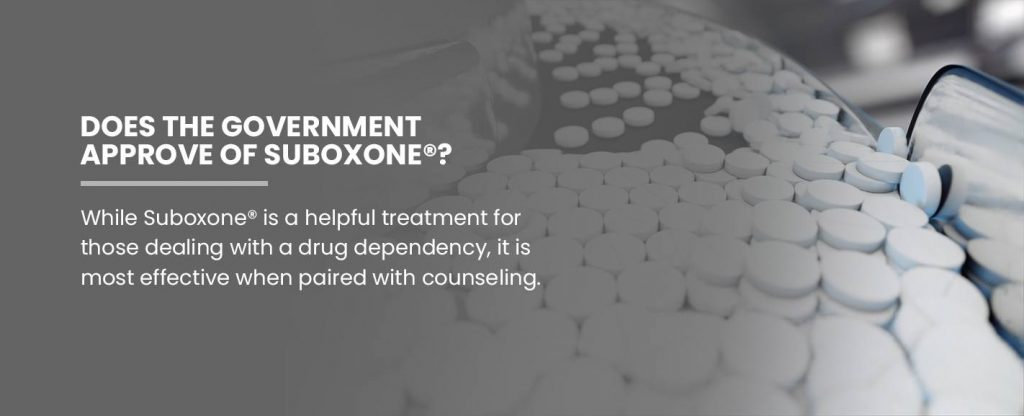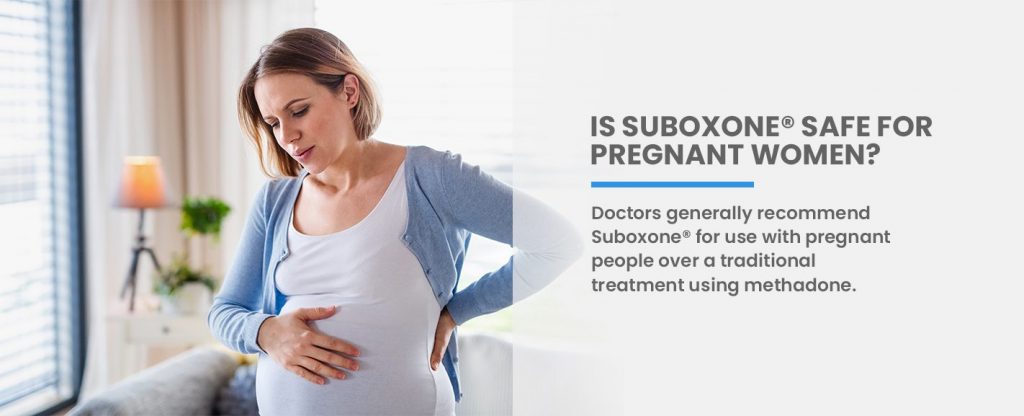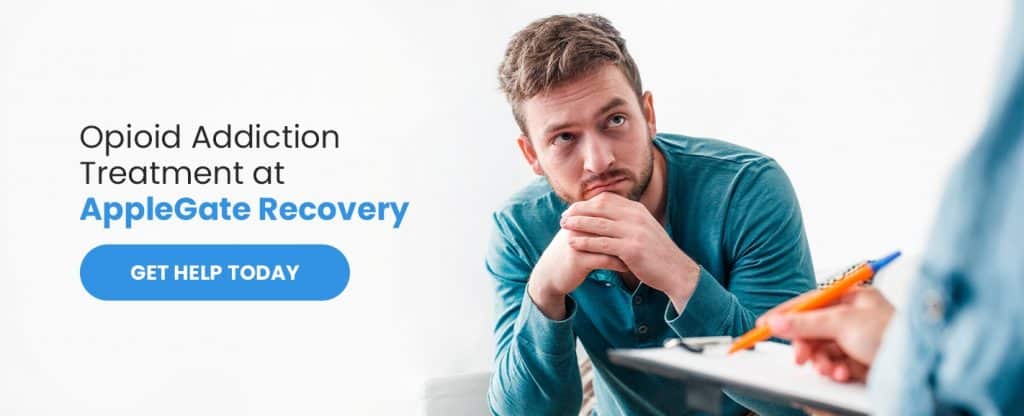Suboxone® is a combination of buprenorphine and naloxone, two medications that can help decrease the severity of withdrawal symptoms and reduce a dependency on opioids. These two medications work together as an effective medication-assisted treatment for drug dependency. MAT is an effective way to help those with a dependence on drugs safely recover and heal.
Suboxone® works by blocking the receptors in the brain that opioids typically affect, allowing those with a drug dependency to experience a safer, more comfortable detoxification period. A Suboxone® treatment can promote an overall feeling of wellness so clients can focus on their recovery process more effectively. Read on to find answers to top questions about Suboxone® and Suboxone® treatment.

Does the Government Approve of Suboxone®?
Buprenorphine, one of the medications in Suboxone®, is an FDA-approved medication to treat opioid use disorder. While Suboxone® is a helpful treatment for those dealing with a drug dependency, it is most effective when paired with counseling. Research has shown that people using buprenorphine were 1.82 times more likely to stay in treatment.
Buprenorphine is one of the first opioid use disorder treatments approved for prescribing and dispensing in a physician’s office, significantly improving this treatment’s accessibility. The government’s Substance Abuse and Mental Health Services Administration approves of Suboxone® as a safe and effective treatment for those dealing with an opioid dependency. Suboxone® also provides numerous other benefits as an effective form of medication-assisted treatment.
- Blocks opioid receptors: ASuboxone® treatment can block the opioid receptors in the brain, which can help those recovering from opioid use experience a less uncomfortable withdrawal process. The correct dose of Suboxone® can help prevent the euphoria traditional opioids create and promote a healthier recovery journey for those dealing with a drug dependence.
- Pairs well with counseling: While Suboxone® is an effective opioid treatment, it provides even better results when paired with traditional counseling. Suboxone® can help clients feel physically well during recovery so they can focus on daily tasks and counseling. A structured counseling program can help clients work on various aspects of their lives and understand what may have contributed to their drug dependence.
- Lowers the potential for misuse: Buprenorphine has opioid properties, which means there is a potential for misuse. Suboxone® combines the benefits of buprenorphine with naloxone, a medication that can help decrease the likelihood of abuse.
- Increases safety: Suboxone® can increase safety in the case of an overdose.
Why Doesn’t Suboxone® Require Daily Visits Like Methadone?
Unlike methadone, a Suboxone® treatment does not require daily visits because it is only a partial opioid agonist. Suboxone® doesn’t provide the same potential for a patient to misuse the medication as methadone does. Suboxone® falls into a unique drug classification because it remains in the system for 24 hours to help people go about their typical daily routine without carrying the same risks that methadone does.
In many cases, Suboxone® comes in a film format that allows clients to take the medication easily. This film format can be difficult to hand from one person to another, which prevents misuse. Additionally, some treatment centers randomly check the amount of Suboxone® film strips a client has to ensure they only take the recommended amount.
Another benefit of Suboxone® film strips is that they feature unique numbering so that staff can tell if the strips someone has are the originally prescribed film strips and not a substitute. Because Suboxone® does not require daily visits, it can be a helpful treatment that may increase clients’ likelihood of clients following through with their treatment plan and future visits.
What Are the Program Requirements During a Suboxone® Treatment?
Program requirements and eligibility for Suboxone® treatments can vary from one person to the next. One of the essential aspects of effective opioid treatment is understanding opioid medication and entering a licensed and certified treatment program with a substance abuse counselor. An accredited treatment program with counseling can provide a structured recovery environment for those dealing with a dependency on drugs.
- Counseling: A counseling program is a necessary part of an effective recovery process that can help you understand opioid addiction. While medication can help improve physical symptoms of withdrawal and recovery, counseling allows you to address your mental health and understand emotions that may contribute to a drug dependency. Counseling can also provide a structured environment for people to decompress and deal with difficult or repressed emotions.
- History of drug dependency: Many treatment facilities and programs require evidence that a client has misused opioids for at least one year. Additionally, clients must be at least 18 years old.
- Presence of withdrawal symptoms: Do not takeSuboxone® when other drugs are still in your system. You should be beginning to feel withdrawal symptoms before starting medication. If you take Suboxone® when other drugs are still present in your system, it can cause precipitated withdrawal, which has much more uncomfortable and dangerous symptoms.

Is Suboxone® Safe for Pregnant Women?
Doctors generally recommend Suboxone® for use with pregnant people over a traditional treatment using methadone. Research has shown that babies exposed to Suboxone® in utero fared as well or even better than babies exposed to conventional opioid treatments, such as methadone. Suboxone® can be a safe and effective treatment for pregnant people with an opioid dependency that can help them through withdrawal.
Before Childbirth
If a physician recommends Suboxone® for pregnant people, they typically receive admission and prescription priority. When a woman enters labor, a physician may prescribe a higher dose of Suboxone® to lessen the need for additional pain medication following childbirth.
After Childbirth
After childbirth, doctors and nurses will closely monitor the newborn for any signs of withdrawal or health-related issues. In most cases, a physician can coordinate a Suboxone® treatment with the new mother’s OB-GYN to ensure she receives the highest possible level of care. Coordinating a Suboxone® treatment can also protect the baby’s health.
Why Should You Use Counseling in Addition to Suboxone® Treatment?
On top of the physical damage a drug dependency takes on the body, it can also adversely affect mental health and lead to depression or anxiety. Many who struggle with a drug dependency may have started misusing substances due to unresolved emotional or mental trauma. When paired with Suboxone® treatment, counseling allows clients to focus on their mental health and begin to work through challenging emotions or thoughts. Counseling is an essential step of recovery that provides numerous benefits.
- Long-term sobriety: An integral step in achieving long-term sobriety is to process complicated emotions that stem from substance dependence or lead a person to seek out opioid use. Remaining sober requires treating opioid dependence on a physical and mental level.
- Addiction triggers: A pivotal element to recovering from a drug dependency is identifying common triggers that may lead to a desire to use again. Identifying these triggers, avoiding them where possible and creating an effective plan for when you encounter them can help you learn how to continue your recovery journey safely.
- Self-forgiveness: Self-forgiveness can be a challenging task to accomplish without a therapist’s help. Opioid addiction counseling provides a safe and non-judgmental setting for you to discuss thorny topics and take accountability for previous actions. While owning up to your mistakes can be hard, counseling provides you with the tools to forgive yourself and see that your future can be brighter with a commitment to sobriety.
Opioid Addiction Treatment at AppleGate Recovery
At AppleGate Recovery, we understand that recovery is a lifelong process. We dedicate ourselves to providing in-depth care with medication-assisted treatment programs to help you become and remain sober. Our team of experts and counselors can provide a structured and safe environment that promotes your recovery and overall well-being. We pride ourselves on creating a comprehensive recovery support system to help you find a successful path to lasting sobriety.
Learn more about opioid addiction treatment and Suboxone® and call 888-488-5337 or contact us online today.

